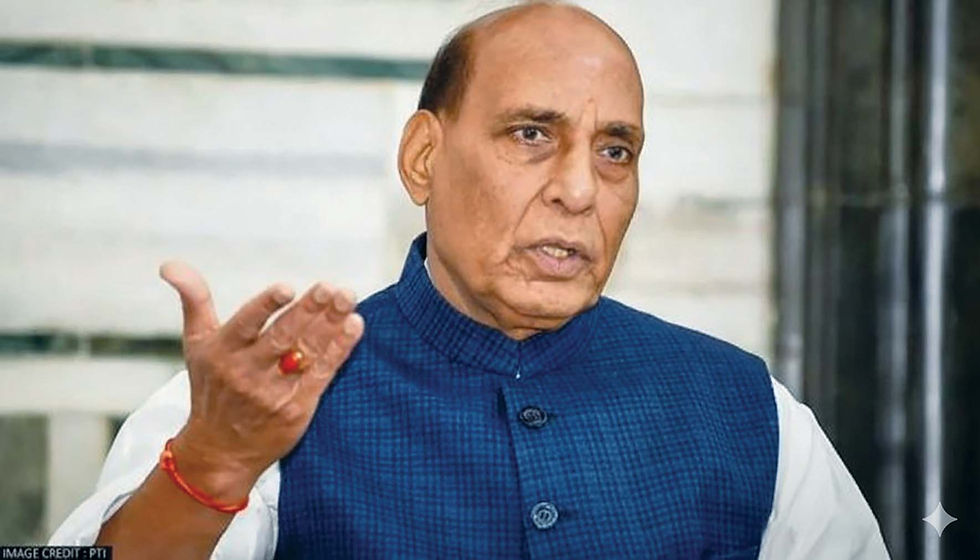Trump’s Perilous One-Man Tango with Pakistan
- Commodore S.L. Deshmukh

- Jun 23
- 4 min read
Donals Trump’s overture to Pakistan army chief Asim Munir reveals more about American misjudgements than any grand geopolitical strategy.

When Donald Trump hosted Pakistan’s army chief, General Asim Munir, for an unusually high-profile lunch at the White House on June 18th, it raised eyebrows in Washington and beyond. In the midst of a volatile Iran-Israel standoff, the gesture appeared less about diplomacy and more about spectacle - a transactional manoeuvre aimed at leveraging an old ally for short-term American interests.
The event drew sharp scrutiny from analysts and observers across South Asia and the Middle East. It was classic Trump: performative, opportunistic and aimed at securing short-term diplomatic leverage with Islamabad’s deep state.
The United States has maintained a fraught yet enduring relationship with Pakistan since its independence in 1947. While couched in the language of partnership, the ties have always been dictated by hard-nosed strategic calculus. For Washington, Pakistan’s importance lies in its geography: perched between Iran, Afghanistan, and China, it offers a convenient fulcrum for projecting American interests in a restive neighbourhood.
Yet this alliance has long been fraught with contradictions. Washington calls Pakistan a counterterrorism partner while turning a blind eye to its double game with jihadist groups. It touts military cooperation while funnelling billions into a country that has rarely aligned itself with broader American interests, especially when they run counter to those of China - Pakistan’s all-weather ally.
Why then does America persist in elevating Pakistan’s military elite to the status of indispensable partners? Part of the answer lies in Washington’s compulsive tendency to play balance-of-power politics by propping up a weaker Pakistan to hedge against a rising India.
America’s military and financial patronage of Pakistan persists despite compelling reasons to rethink the equation. Following the chaotic withdrawal from Afghanistan in 2021, Washington is keen to preserve a foothold in South Asia. Pakistan, for its part, remains useful at least superficially in nudging the Taliban and providing intelligence. But this indulgence comes at a cost. It emboldens Pakistan’s military establishment, destabilizes India’s western flank, and risks undermining burgeoning US-India ties, which are critical to the Indo-Pacific strategy aimed at counterbalancing China. A strong Indo-US partnership is crucial for balancing China’s growing assertiveness in the Indo-Pacific. By mollycoddling Pakistan, our historic rival, Washington injects instability into South Asia’s strategic landscape.
The recent $450m sustainment package for Pakistan’s F-16 fleet was justified on counterterrorism grounds. Pentagon officials even went so far as to describe Pakistan as a ‘reliable partner.’ That same Pakistan, however, was recently elevated to the vice-chair of the UN Security Council’s Counterterrorism Committee—despite decades of tolerating, if not abetting, extremist groups. Such decisions muddy Washington’s credibility and exasperate its democratic allies.
By continuing to equate Pakistan with India, the US undermines its own strategic calculus. India, unlike Pakistan, is a democratic bulwark against Chinese assertiveness in Asia. To lump them together in a Cold War-style balancing act reveals an outdated lens.
Worse still is the fantasy that Pakistan can be peeled away from China. That horse bolted long ago. Pakistan is reliant on Beijing for everything from weapons and infrastructure to bailouts and diplomatic cover. No number of White House banquets will undo that reality.
As for the luncheon itself, many see it as classic Trump: impulsive, optics-driven, and tactically shallow. Reports suggest the two-hour meeting included discussions on counterterrorism and regional peace. But almost immediately after the photo ops ended, Pakistan delivered a sharp rebuke of US airstrikes on Iran, undercutting any illusion of diplomatic alignment. This came just a day after Pakistan had lauded Trump’s role in mediating during recent Indo-Pak tensions, with Munir flattering Trump’s outsize ego by stating the President ought to be nominated for a Nobel Peace Prize. Yet another example of Islamabad’s breathtaking doublespeak.
Pakistan’s tightrope walk is no surprise. With strong ties to Gulf monarchies and a complicated relationship with Tehran, Pakistan cannot afford to alienate either side. Nor can it ignore the consequences of an Iranian collapse. Prolonged escalation in the Middle East, particularly near the Strait of Hormuz, would spike oil prices and plunge Pakistan, already reeling from inflation and power shortages, into deeper turmoil.
There are also deep sectarian undercurrents to consider. Pakistan, a Sunni-majority country with a significant Shiite minority, has long struggled with sectarian tensions. A wider Middle East conflict infused with religious symbolism would be a tinderbox for domestic unrest. Renewed proxy warfare, radical propaganda, or targeted violence are all plausible outcomes should regional tensions escalate.
If sectarian rhetoric takes hold, Pakistan could become a tinderbox. The last thing it needs is imported conflict cloaked in religious symbolism. Trump may view Pakistan as a pliable piece on his global chessboard, but the reality is far messier.
Trump would do well to heed the caution of Senator William Proxmire: “Power always has to be kept in check; power exercised in secret, especially under the cloak of national security, is doubly dangerous.”
(The writer is a retired naval aviation officer and a defence and geopolitical analyst. Views personal)





Comments